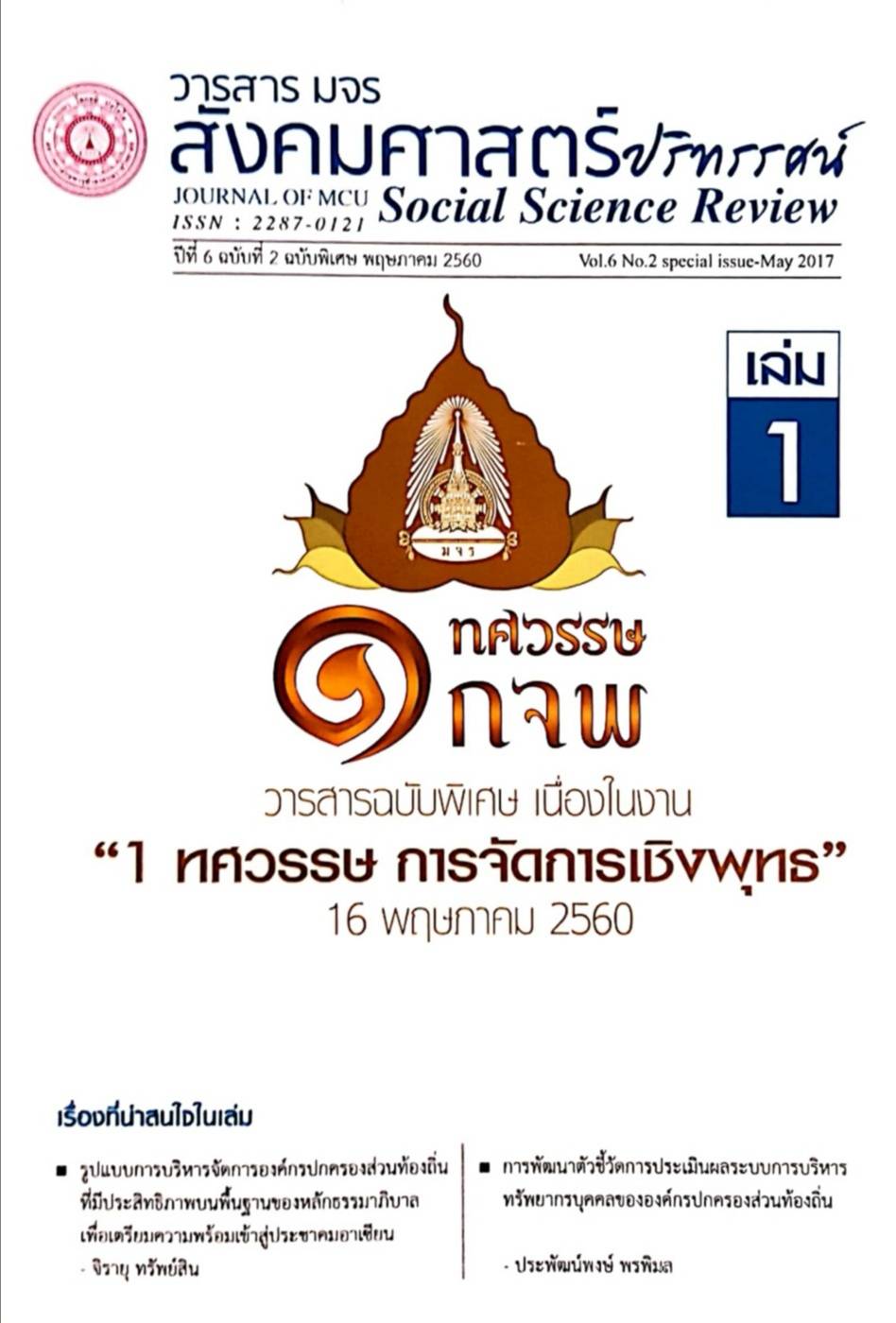การพัฒนาหลักสูตรเสริมสร้างความฉลาดทางสุขภาวะตามแนวคิดการเรียนรู้ แบบมีส่วนร่วมและการเรียนรู้โดยการกากับตนเองสาหรับนักเรียนระดับประถมศึกษา
บทคัดย่อ
การวิจัยนี้มีวัตถุประสงค์เพื่อ 1) พัฒนาหลักสูตรเสริมสร้างความฉลาดทางสุขภาวะตามแนวคิดการเรียนรู้แบบมีส่วนร่วมและการเรียนรู้โดยการกากับตนเองสาหรับนักเรียนระดับระถม
ศึกษา 2) ศึกษาผลของการใช้หลักสูตรเสริมสร้างความฉลาดทางสุขภาวะตามแนวคิดการเรียนรู้แบบมีส่วนร่วมและการเรียนรู้โดยการกากับตนเองสาหรับนักเรียนระดับประถมศึกษา ในประเด็นย่อย
ดังนี้ 2.1) เปรียบเทียบความฉลาดทางสุขภาวะของนักเรียน ที่เรียนด้วยหลักสูตรเสริมก่อนและหลังเรียน 2.2) เปรียบเทียบความฉลาดทางสุขภาวะของนักเรียนที่เรียนด้วยหลักสูตรเสริมกับระดับขั้น
การพัฒนาความฉลาดทางสุขภาวะ 3) ศึกษาความพึงพอใจของนักเรียนที่มีต่อการเรียนด้วยหลักสูตรเสริม ดาเนินการวิจัยเป็น 4 ขั้นตอน คือ ขั้นตอนที่ 1 การศึกษาข้อมูลพื้นฐาน ขั้นตอนที่ 2
การยกร่างหลักสูตรเสริม ขั้นตอนที่ 3 การทดลองใช้หลักสูตรเสริม และขั้นตอนที่ 4 การประเมินและปรับปรุงหลักสูตรเสริม กลุ่มตัวอย่างที่ใช้ในการทดลองเป็นนักเรียนชั้นประถมศึกษาปีที่ 4-6
โรงเรียนบ้านสงเปือย ภาคเรียนที่ 1 ปีการศึกษา 2557 ที่มีคะแนนความฉลาดทางสุขภาวะต่ากว่าเปอร์เซ็นต์ไทล์ที่ 25 จานวน 30 คน เครื่องมือที่ใช้ในการทดลอง คือ แบบทดสอบวัดความฉลาด
ทางสุขภาวะ และแบบสอบถามความพึงพอใจของนักเรียนที่มีต่อการเรียนการสอนตามหลักสูตรเสริม การวิเคราะห์ข้อมูลเป็นการวิเคราะห์ทั้งเชิงปริมาณและเชิงคุณภาพ ซึ่งสถิติที่ใช้ในการ
วิเคราะห์ข้อมูลเชิงปริมาณ ได้แก่ ค่าเฉลี่ย ค่าเบี่ยงเบนมาตรฐาน และการทดสอบค่าที ข้อมูลเชิงคุณภาพใช้การวิเคราะห์เนื้อหา ผลการวิจัยพบว่า 1) หลักสูตรที่พัฒนาขึ้นประกอบด้วย 6
องค์ประกอบ คือ 1.1 หลักการของหลักสูตร 1.2 จุดมุ่งหมายของหลักสูตร 1.3 โครงสร้างของหลักสูตร โดยจัดเป็นหน่วยการเรียนรู้ทั้งหมด 6 หน่วย ดังนี้ หน่วยการเรียนรู้ที่ 1 รู้และเข้าใจเรื่อง
สุขภาพ (6 ชั่วโมง) หน่วยการเรียนรู้ที่ 2 เข้าถึงข้อมูลสุขภาพ (8 ชั่วโมง) หน่วยการเรียนรู้ที่ 3 สื่อสารข้อมูลสุขภาพ (6 ชั่วโมง) หน่วยการเรียนรู้ที่ 4 ตัดสินใจเกี่ยวกับสุขภาพ (6 ชั่วโมง) หน่วย
การเรียนรู้ที่ 5 จัดการตนเองเกี่ยวกับสุขภาพ (6 ชั่วโมง) 1.6 หน่วยการเรียนรู้ที่ 6 รู้เท่าทันสื่อ (4 ชั่วโมง) 1.4 แนวทางการจัดกิจกรรม
การเรียนรู้ ผสมผสานทฤษฎีการเรียนรู้แบบมีส่วนร่วม และทฤษฎีการเรียนรู้โดยการ กากับตนเอง โดยที่ขั้นตอนหลักในการจัดกิจกรรมการเรียนรู้ใช้กระบวนการเรียนรู้แบบมีส่วนร่วม
ส่วนการเรียนรู้โดยการกากับตนเองจะสอดแทรกเข้าไปในขั้นทดลอง/ประยุกต์แนวคิด 1.5 สื่อการเรียนรู้ 1.6 การวัดและประเมินผลการเรียนรู้ 2) ผลการใช้หลักสูตรที่พัฒนาขึ้น พบว่า
2.1) นักเรียนที่เรียนด้วยหลักสูตรเสริมสร้างความฉลาดทางสุขภาวะตามแนวคิดการเรียนรู้แบบมีส่วนร่วมและการเรียนรู้โดยการกากับตนเองมีความฉลาดทางสุขภาวะหลังเรียนสูงกว่าก่อนเรียน
อย่างมีนัยสาคัญทางสถิติที่ระดับ.05 2.2) นักเรียนที่เรียนด้วยหลักสูตรเสริมสร้างความฉลาดทางสุขภาวะตามแนวคิดการเรียนรู้แบบมีส่วนร่วมและการเรียนรู้โดยการกากับตนเองมีการพัฒนาความ
ฉลาดทางสุขภาวะในระดับขั้นที่สูงขึ้น 2.3) นักเรียนที่เรียนด้วยหลักสูตรเสริมสร้างความฉลาดทางสุขภาวะตามแนวคิดการเรียนรู้แบบมีส่วนร่วมและการเรียนรู้โดยการกากับตนเอง มีความพึงพอใจ
ต่อการเรียนด้วยหลักสูตรเสริมอยู่ในระดับมากที่สุด (ค่าเฉลี่ย = 4.73)
เอกสารอ้างอิง
นาไปใช้ใน การดาเนินงานสุขศึกษาและพัฒนาพฤติกรรมสุขภาพ. กรุงเทพฯ: โรง
พิมพ์กองสุขศึกษา.
ขวัญเมือง แก้วดาเกิง และนฤมล ตรีเพชรอุไร.(2554). ความฉลาดทางสุขภาพ. กรุงเทพฯ: กองสุข
ศึกษากรมสนับสนุนบริการสุขภาพ กระทรวงสาธารณสุข
นฤมล ตรีเพชรศรีอุไร และเดช เกตุฉ่า (2554). “รายงานการวิจัยการพัฒนาเครื่องมือวัดความๆ
ฉลาด ทางสุขภาพเกี่ยวกับโรคอ้วนของนักเรียนระดับมัธยมศึกษาปีที่ 3” (ระยะที่1).
กรุงเทพ: กองสุขศึกษา กรมสนับสนุนบริการสุขภาพ กระทรวงสาธารณสุข.
วิจิตร์พร หล่อสุวรรณกุล. (2544). “การพัฒนาหลักสูตรเสริมเพื่อพัฒนาทักษะการคิดอย่างมี
วิจารณญาณ ในกระบวนการพยาบาล”. ปริญญานิพนธ์การศึกษาดุษฎีบัณฑิต.
วิจัย. คณะศึกษาศาสตร์มหาวิทยาลัยศรีนครินทรวิโรฒ.
วิชัย วงษ์ใหญ่. (2552). หลักสูตรสารานุกรมวิชาชีพครูเฉลิมพระเกียรติพระบาทสมเด็จพระ
เจ้าอยู่หัวเนื่องในวโรกาสมหามงคลเฉลิมพระชนมพรรษา 80พรรษา. กรุงเทพฯ :
สานักงานเลขาธิการคุรุสภา.
วรวุฒิ จิรสุจริตธรรม. (2553). “การพัฒนาหลักสูตรเสริมเพื่อพัฒนาทักษะภาวะผู้นาเยาวชนใน
โรงเรียนอาชีวศึกษาคาทอลิก ”. ปริญญา กศ.ด. กรุงเทพฯ: มหาวิทยาลัย
ศรีนครินทรวิโรฒ,.
ศิริพร โอภาสวัดชัย. (2543). “ผลการจัดการเรียนการสอนที่อิงตัวแปรคัดสรรของการเรียนรู้
โดยการกา กับตนเองของนักศึกษาพยาบาล”. วิทยานิพนธ์ ค.ด. กรุงเทพฯ
จุฬาลงกรณ์มหาวิทยาลัย.
สมพร หลิมเจริญ. (2552). “การพัฒนาหลักสูตรเสริมเพื่อส่งเสริมความคิดสร้างสรรค์สาหรับ
นักเรียนช่วงชั้นที่ 2”. ปริญญานิพนธ์ กศ.ด. กรุงเทพฯ: มหาวิทยาลัย
ศรีนครินทรวิโรฒ
สุมณฑา พรหมบุญ และอรพรรณ พรสีมา. (2549). การเรียนรู้แบบมีส่วนร่วม ทฤษฎีการเรียนรู้
แบบมีส่วนร่วม : ต้นแบบการเรียนรู้ทางด้านหลักทฤษฎีและแนวปฏิบัติ. กรุงเทพฯ:
สานักงานคณะกรรมการการศึกษาแห่งชาติ.
อัคพงศ์ สุขมาตย์, (2543). “การพัฒนาหลักสูตรเสริมสร้างคุณลักษณะที่พึงประสงค์ของนักเรียน
ชั้นประถมศึกษาปีที่ 4”. วิทยานิพนธ์การศึกษาดุษฎีบัณฑิต. มหาวิทยาลัย
ศรีนครินทรวิโรฒ
ดาวน์โหลด
เผยแพร่แล้ว
รูปแบบการอ้างอิง
ฉบับ
ประเภทบทความ
สัญญาอนุญาต
ลิขสิทธิ์ (c) 2020 วารสาร มจร สังคมศาสตร์ปริทรรศน์

อนุญาตภายใต้เงื่อนไข Creative Commons Attribution-NonCommercial-NoDerivatives 4.0 International License.
เพื่อให้เป็นไปตามกฎหมายลิขสิทธิ์ ผู้นิพนธ์ทุกท่านต้องลงลายมือชื่อในแบบฟอร์มใบมอบลิขสิทธิ์บทความให้แก่วารสารฯ พร้อมกับบทความต้นฉบับที่ได้แก้ไขครั้งสุดท้าย นอกจากนี้ ผู้นิพนธ์ทุกท่านต้องยืนยันว่าบทความต้นฉบับที่ส่งมาตีพิมพ์นั้น ได้ส่งมาตีพิมพ์เฉพาะในวารสาร มจร สังคมศาสตร์ปริทรรศน์ เพียงแห่งเดียวเท่านั้น หากมีการใช้ภาพหรือตารางหรือเนื้อหาอื่นๆ ของผู้นิพนธ์อื่นที่ปรากฏในสิ่งตีพิมพ์อื่นมาแล้ว ผู้นิพนธ์ต้องขออนุญาตเจ้าของลิขสิทธิ์ก่อน พร้อมทั้งแสดงหนังสือที่ได้รับการยินยอมต่อบรรณาธิการ ก่อนที่บทความจะได้รับการตีพิมพ์ หากไม่เป็นไปตามข้อกำหนดเบื้องต้น ทางวารสารจะถอดบทความของท่านออกโดยไม่มีข้อยกเว้นใดๆ ทั้งสิ้น





